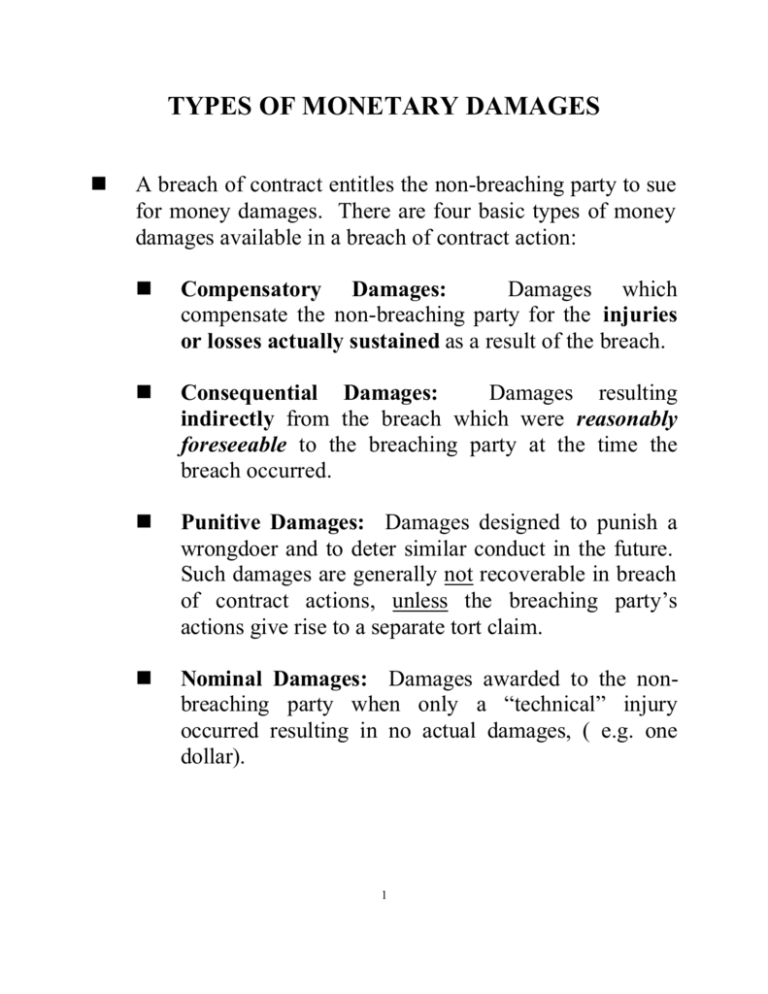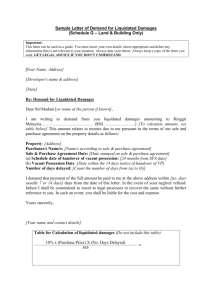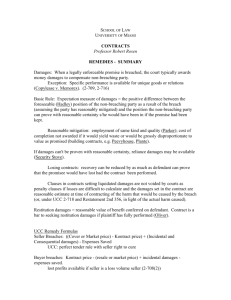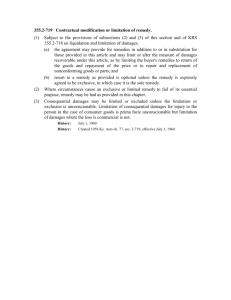TYPES OF MONETARY DAMAGES
advertisement

TYPES OF MONETARY DAMAGES n A breach of contract entitles the non-breaching party to sue for money damages. There are four basic types of money damages available in a breach of contract action: n Compensatory Damages: Damages which compensate the non-breaching party for the injuries or losses actually sustained as a result of the breach. n Consequential Damages: Damages resulting indirectly from the breach which were reasonably foreseeable to the breaching party at the time the breach occurred. n Punitive Damages: Damages designed to punish a wrongdoer and to deter similar conduct in the future. Such damages are generally not recoverable in breach of contract actions, unless the breaching party’s actions give rise to a separate tort claim. n Nominal Damages: Damages awarded to the nonbreaching party when only a “technical” injury occurred resulting in no actual damages, ( e.g. one dollar). 1 COMPENSATORY DAMAGES n Compensatory damages are calculated as follows: The value of the performance as promised – The value of the performance actually rendered – The value of any loss avoided, or mitigated, by the non-breaching party + Incidental damages by the non-breaching party _______________________________________________ = Compensatory damages. n Incidental Damages: Expenses or costs that are caused by the breach of contract, such as the costs incurred in obtaining performance from another source. n “Market Value” Damages: In cases involving contracts for the sale of goods or, in most states, land, compensatory damages generally equal the difference between the contract price of the goods or land and the fair market price at the time the goods or title to the land was to be delivered. 2 MITIGATION, LIQUIDATED DAMAGES, AND PENALTIES n Mitigation of Damages: In most situations, when a breach of contract occurs, the non-breaching party has a duty to take whatever action is reasonable to minimize the damages caused by the breach. n For example, in most instances, people who are fired by their employer, regardless of the reason, have a duty to find a new job. Likewise, buyers of goods have a duty to take reasonable steps to locate replacement goods. n Liquidated Damages: Many contracts contain provisions specifying a sum certain of money to be paid by the breaching party in the event that he or she fails to perform as required by the contract. Generally speaking, the liquidated damages are enforceable as long as the clause is based on a reasonable estimate of the value of the promised performance. n Penalties: By contrast, a penalty provision specifies sum certain of money, bearing no reasonable relationship to the value of performance, to be paid by the breaching party in the event of default or breach. Penalty provisions are rarely enforceable. 3 EQUITABLE REMEDIES n In addition to the foregoing types of money damages, there are several equitable (i.e., non-damage) remedies available. n Rescission: Canceling a contract and returning the parties to their pre-contract position. n Restitution: Returning good, property, or money previously transferred in order to restore the nonbreaching party to his or her pre-contract position. n Specific Performance: Requiring the breaching party to perform exactly as called for in the contract. n n This remedy is usually granted only when money damages would be an inadequate remedy and the subject matter of the contract is unique (e.g., contract to purchase an original Picasso or a particular tract of real property). Reformation: A remedy allowing the contract to be re-written to reflect the true intent of the parties. n This remedy is typically limited to cases of fraud or mutual mistake. 4 RECOVERY BASED ON QUASI-CONTRACT n Quasi-contract: A remedy available to prevent one party from being unjustly enriched at the other party’s expense. n As a general principle, equity requires that when one party confers something of value or other benefit, the other party must pay a reasonable value (in money or other valuable goods or services) for it. n Quasi-contractual recovery is particularly useful when one party has partially performed under a contract that subsequently becomes unenforceable. n The party seeking to recover in quasi-contract must show that: (1) A benefit was conferred on the other party; (2) The conferring party expected to be paid or otherwise compensated for the benefit conferred; (3) The conferring party did not voluntarily confer benefits for which he or she would not be paid; and (4) Retaining the benefit without paying for it would unjustly enrich the party receiving the benefit. 5 CONTRACT DOCTRINES RELATING TO REMEDIES n Election of Remedies: A nonbreaching party must choose one remedy from those available to prevent double recovery or a windfall. n Provisions Limiting Remedies: A contract may contain an “exculpatory” clause and/or a “ limitation of liability” clause. Generally clauses excluding liability for fraud or intentional injuries will not be enforced. 6








